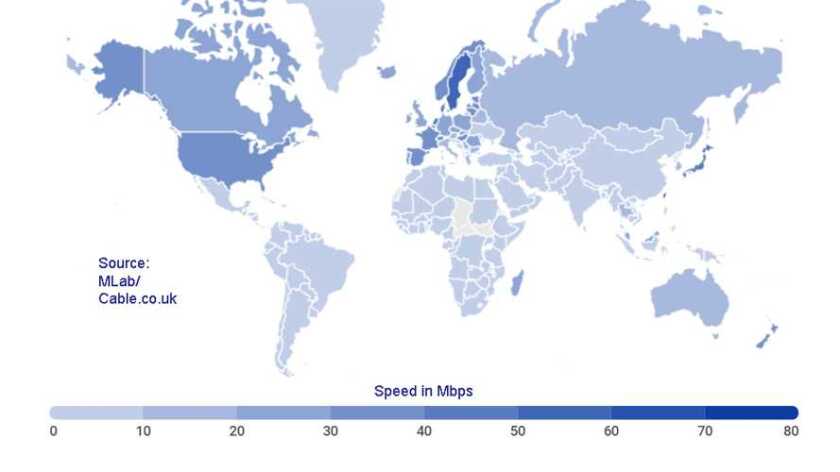The average global broadband speed has gone up from 9.14Mbps in the 12 months to May 2018 to 11.03Mbps in the 12 months to May 2019, according to the data, gathered by Measurement Lab (M-Lab), a US-based open source project.
Dan Howdle, consumer telecoms analyst at Cable.co.uk, which pulled together the M-Lab data, said: “With average broadband speeds rising by 20.65% in the last year the global picture looks rosy. But the truth is faster countries are the ones lifting the average, pulling away at speed and leaving the slowest to stagnate. Last year, we measured the slowest five countries at 88 times slower than the five fastest. This year they are 125 times slower.”
In this year’s league table the top 15 places are all in Europe and Asia (see map above), with the US taking the top spot in the rest of the world, at sixteenth position.
Belgium, Denmark, the Netherlands, Norway, Spain, Sweden and Switzerland are all in the top 15, as are Japan and Singapore. France is at number 22 in the world, ahead of Germany at number 27 and the UK at number 34.
The league table shows that downloading an HD movie of 5GB in size would take eight minutes and two seconds at the average speed experienced in Taiwan, while it would take over 30 hours in last-placed Yemen.
Other countries low down in the league – which lists 207 countries and territories – are China at 152, Djibouti at 198, despite its position as the landing station for many Asia-Africa-Europe subsea cables, and Ethiopia, which still has a monopoly operator, at 201.
M-Lab, the source of the data, is led by teams based at Code for Science and Society, New America’s Open Technology Institute, Google, Princeton University’s PlanetLab, and other supporting partners.
Chris Ritzo, programme management and community lead at M-Lab, said: “Average speed rankings by country are … a great starting point for deeper research and statistical analysis of the state of broadband using M-Lab’s global broadband measurement datasets.”
For this year’s research, M-Lab carried out 276 million speed tests on 70 million different IP addresses. The full league table, an interactive map and details of the methodology can be downloaded from here.






